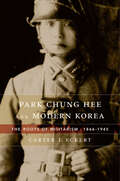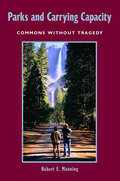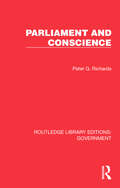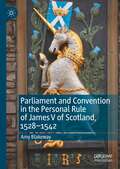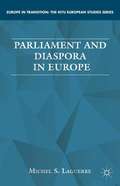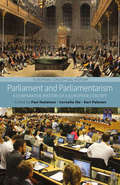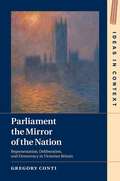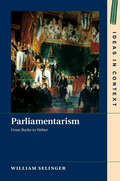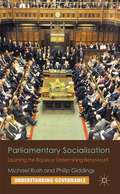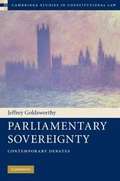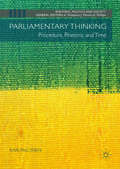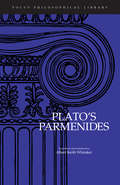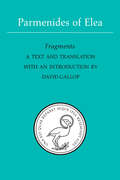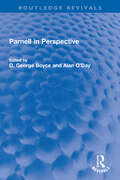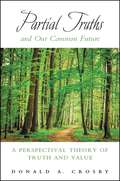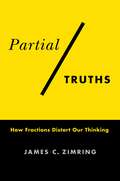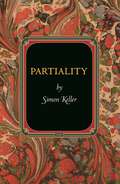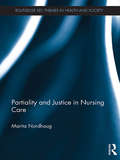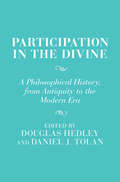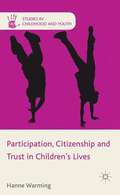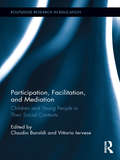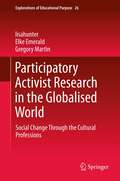- Table View
- List View
Park Chung Hee and Modern Korea: The Roots of Militarism, 1866–1945
by Carter J. EckertThis first volume in a two-part study examines the origins of South Korean authoritarianism as personified by the militant political leader. For South Koreans, the twenty years from the early 1960s to late 1970s were the best and worst of times—a period of unprecedented economic growth and of political oppression that deepened as prosperity spread. In this masterly account, Carter J. Eckert finds the roots of South Korea&’s dramatic socioeconomic transformation in the country&’s long history of militarization—a history personified in South Korea&’s paramount leader, Park Chung Hee. In Park Chung Hee and Modern Korea, Eckert reveals how the foundations of Park&’s leadership were established during the period of Japanese occupation. As a cadet in the Manchurian Military Academy, Park and his fellow officers absorbed the Imperial Japanese Army&’s ethos of victory at all costs and absolute obedience to authority. When Park seized power in 1961, he applied this ethos to the project of Korean modernization. Korean society under Park exuded a distinctively martial character, Eckert shows. Its hallmarks included the belief that the army should intervene in politics in times of crisis; that a central authority should manage the country&’s economic system; and that the state should maintain a strong disciplinary presence in society, reserving the right to use violence to maintain order.&“A milestone in the literature of modern East Asia.&” ―Bruce Cumings, author of Korea&’s Place in the Sun
Parks and Carrying Capacity: Commons Without Tragedy
by Robert E. ManningHow much can we use the environment without spoiling what we find so valuable about it? Determining the carrying capacity of parks and related areas is a perennial question whose urgency grows each year as the number of visits continues to increase. Parks and Carrying Capacity represents a comprehensive assessment of the issue, as it:* offers a historical and conceptual treatment ofcarrying capacity* describes and illustrates research approaches forassessing carrying capacity, including qualitative and quantitativesurveys, normative theory and methods, visual research approaches,trade-off analysis, and simulation modeling* examines management alternatives for limiting the environmentaland social impacts of visitor use* considers the broader question of environmental management andhow the issue of carrying capacity can be applied more generally* discusses how the theory and methods associated with managingthe carrying capacity of parks and protected areas might be extendedto other areas of environmental managementThe book includes a series of case studies that describe research programsdesigned to support analysis and management of carrying capacity at eight diverse units of the U.S. National Park System, and an additional case study that explores how the foundational components of carrying capacity (formulating indicators and standards, monitoring, and adaptive management) are being applied in an increasing number of environmental and natural resources fields to address the growing urgency of sustainability. Parks and Carrying Capacity is an important new work for faculty, graduate and undergraduate students, and researchers in outdoor recreation, park planning and management, and natural resource conservation and management, as well as for professional planners and managers involved with park and outdoor recreation related agencies and nongovernmental organizations.
Parliament and Conscience (Routledge Library Editions: Government)
by Peter G. RichardsOriginally published in 1970, this book has a dual purpose. Firstly, it is a study of how Parliament works when the party whips are withdrawn. The author shows how backbenchers can create legislation of great importance; he demonstrates the obstacles, political and procedural to social reform; he relates the votes of MPs to their personal characteristics e.g. age, religion and occupation, and he argues that Parliament achieves a fresh vigour and authority when MPs think and act independently of party policy. Secondly, Parliament and Conscience analyses 6 major controversies in British society in the late 20th Century: the death penalty, homosexuality, abortion, theatre censorship, divorce and Sunday entertainment.
Parliament and Convention in the Personal Rule of James V of Scotland, 1528–1542
by Amy BlakewayThis book, based on a fresh understanding of Scottish governmental records rooted in extensive archival research, offers the first study of these important institutions in a period of revived royal authority. The regime which emerges from these records is one which understood the power of consultation, adroitly using a range of groups from full parliaments to conventions of specialists and experts selected to deal with the matter in hand. Policies were crafted through not one single meeting but several types of gathering, ranging from small groups when secrecy was of the essence or complex details required to be hammered out, to elaborate large gatherings when the regime employed a performative strategy to disseminate information or legitimise its policies. Still more impressively, much of this was managed in the King’s absence – James remained at a distance from many of these gatherings, relying on key officials such as the Chancellor or Clerk Register to relay counsel and the royal will. This emphasis on specialised, frequent consultation reflects concurrent developments in the council, whilst relocating debate surrounding the development of state and administrative structures in Scotland traditionally located in the late sixteenth-century into the 1530s. In tackling the development of parliament in Scotland and placing it in its proper context amongst many different forms of consultative meeting this book also speaks to subjects of European-wide concern: how far early modern Parliaments were used to impose or resist religious change, the pace of state formation, monarchical power and relations between monarchs and their subjects.
Parliament and Diaspora in Europe
by Michel S. LaguerreThe merging of homeland and diaspora, which results in the formation of an expanded and cross-border nation, has helped to transform the national legislature into a cosmonational parliament governed by representatives from these two segments of the population. The book analyzes the deployment of diaspora representation in homeland parliaments in its various forms, and compares this deployment in three European national settings in an effort to explain the multiple dimensions of this new cosmonational parliament model.
Parliament and Parliamentarism
by Pasi Ihalainen Cornelia Ilie Kari PalonenParliamentary theory, practices, discourses, and institutions constitute a distinctively European contribution to modern politics. Taking a broad historical perspective, this cross-disciplinary, innovative, and rigorous collection locates the essence of parliamentarism in four key aspects-deliberation, representation, responsibility, and sovereignty-and explores the different ways in which they have been contested, reshaped, and implemented in a series of representative national and regional case studies. As one of the first comparative studies in conceptual history, this volume focuses on debates about the nature of parliament and parliamentarism within and across different European countries, representative institutions, and genres of political discourse.
Parliament the Mirror of the Nation: Representation, Deliberation, and Democracy in Victorian Britain (Ideas in Context #119)
by Gregory ContiThe notion of 'representative democracy' seems unquestionably familiar today, but how did the Victorian era - the epoch when the modern democratic state was made - understand democracy, parliamentary representation, and diversity? In the famous nineteenth-century debates about representation and parliamentary reform, two interlocked ideals were of the greatest importance: descriptive representation, that the House of Commons 'mirror' the diversity that marked society, and deliberation within the legislative assembly. These ideals presented a major obstacle to the acceptance of a democratic suffrage, which it was widely feared would produce an unrepresentative and un-deliberative House of Commons. Here, Gregory Conti examines how the Victorians conceived the representative and deliberative functions of the House of Commons and what it meant for parliament to be the 'mirror of the nation'. Combining historical analysis and political theory, he analyses the fascinating nineteenth-century debates among contending schools of thought over the norms and institutions of deliberative representative government, and explores the consequences of recovering this debate.
Parliamentarism: From Burke to Weber (Ideas in Context #121)
by William SelingerFor eighteenth- and nineteenth-century authors such as Burke, Constant, and Mill, a powerful representative assembly that freely deliberated and controlled the executive was the defining institution of a liberal state. Yet these figures also feared that representative assemblies were susceptible to usurpation, gridlock, and corruption. Parliamentarism was their answer to this dilemma: a constitutional model that enabled a nation to be truly governed by a representative assembly. Offering novel interpretations of canonical liberal authors, this history of liberal political ideas suggests a new paradigm for interpreting the development of modern political thought, inspiring fresh perspectives on historical issues from the eighteenth to early twentieth centuries. In doing so, Selinger suggests the wider significance of parliament and the theory of parliamentarism in the development of European political thought, revealing how contemporary democratic theory, and indeed the challenges facing representative government today, are historically indebted to classical parliamentarism.
Parliamentary Socialisation
by Michael Rush Philip GiddingsParliament and MPs are held in low esteem at a time when Britain is facing major challenges. Can Parliament change to help meet these challenges? Or are MPs simply socialised into the ways of the Westminster village? Parliamentary Socialisation is the first book-length study of the socialisation of MPs. Surveying the literature on legislative socialisation, it develops a model of parliamentary socialisation as a framework for the book. Using a series of questionnaires covering two Parliaments, the book explores what MPs think about their roles and how they learn their jobs. MPs' patterns of behaviour are explored through analyses of their participation in debates, use of Parliamentary Questions, and committee work. The book concludes that MPs face a steep learning curve when first elected and that they are subject to a considerable degree of socialisation, but also argues that MPs' attitudes and behaviour can and do change.
Parliamentary Sovereignty
by Jeffrey GoldsworthyThis book has four main themes: (1) a criticism of 'common law constitutionalism', the theory that Parliament's authority is conferred by, and therefore is or can be made subordinate to, judge-made common law; (2) an analysis of Parliament's ability to abdicate, limit or regulate the exercise of its own authority, including a revision of Dicey's conception of sovereignty, a repudiation of the doctrine of implied repeal and the proposal of a novel theory of 'manner and form' requirements for law-making; (3) an examination of the relationship between parliamentary sovereignty and statutory interpretation, defending the reality of legislative intentions, and their indispensability to sensible interpretation and respect for parliamentary sovereignty; and (4) an assessment of the compatibility of parliamentary sovereignty with recent constitutional developments, including the expansion of judicial review of administrative action, the Human Rights and European Communities Acts and the growing recognition of 'constitutional principles' and 'constitutional statutes'.
Parliamentary Thinking: Procedure, Rhetoric and Time (Rhetoric, Politics and Society)
by Kari PalonenThe parliamentary style of politics has been formed over centuries; nobody theorised it in advance. This book presents a thought experiment to spell out key principles of the parliamentary ideal type of politics. Max Weber offers the main intellectual inspiration, Westminster parliament provides the main historical reference and the author’s studies on parliamentary procedure and rhetoric provide the background for the book. Parliamentary acting and thinking offer us the best example of politics as a contingent and controversial activity. Using a parliamentary imagination, the author constructs the ideal type in five main chapters: dissensual modes of proceeding; rhetoric of parliamentary debate; parliamentary formation and control of government; parliamentarians as politicians; and parliamentary time as their common subtext. In the last two chapters, the book outlines the possibilities of extending parliamentary judgment to politics beyond parliaments proper and the chances for parliamentary politics succeeding today.
Parmenides
by PlatoThe awe with which Plato regarded the character of 'the great' Parmenides has extended to the dialogue which he calls by his name.
Parmenides (Focus Philosophical Library)
by PlatoThis is an English translation of one of the more challenging and enigmatic of Plato's dialogues between Socrates and Parmenides and Zeno of Elea, that begins with Zeno defending his treatise of Parmenidean monism against those partisans of plurality. Focus Philosophical Library translations are close to and are non-interpretative of the original text, with the notes and a glossary intending to provide the reader with some sense of the terms and the concepts as they were understood by Plato’s immediate audience.
Parmenides of Elea
by David GallopDavid Gallop provides a Greek text and a new facing-page translation of the extant fragments of Parmenides' philosophical poem. He also includes the first complete translation into English of the contexts in which the fragments have been transmitted to us, and of the ancient testimonia regarding Parmenides' life and thought. All of the fragments have been translated in full and are arranged in the order that has become canonical since the publication of the fifth edition of Diels-Rranz's Die Fragmente der Vorsokratiker. Alternative renderings are provided for passages whose meaning is disputed or where major questions of interpretation hinge upon the text or translation adopted. In an extended introductory essay, Gallop offers guidance on the background of the poem, and a continuous exposition of it, together with a critical discussion of its basic argument. The volume also includes an extensive bibliography, a glossary of key terms in the poem, and a section on sources and authorities.
Parnell in Perspective (Routledge Revivals)
by Alan O’Day D. George BoyceFirst published in 1991, Parnell in Perspective is a collection of essays exploring the ideas and political style of Charles Stewart Parnell. Divided into two parts, the book explores Parnell’s career in detail and investigates the parliamentary and personal qualities that led to his reputation as ‘The Uncrowned King of Ireland’. It will appeal to those with an interest in Irish and British political and social history.
Parteienforschung: Ein Überblick
by Elmar WiesendahlDas Buch des bekannten deutschen Parteienforschers Elmar Wiesendahl stellt die Entwicklung, theoretischen Perspektiven, Forschungsansätze und Untersuchungsfelder der Parteienforschung mit Blick auf den aktuellen Diskussionsstand dar.
Parteienwettbewerb und Wählerverhalten im deutschen Mischwahlsystem (Wahlen und politische Einstellungen)
by Anna-Sophie Kurella Franz Urban Pappi Thomas BräuningerDas Buch liefert eine erste umfassende Analyse der komplexen Wechselwirkungen des Wählerverhaltens und der Parteistrategien im deutschen Mischwahlsystem. Nach einer ausführlichen Einführung in die räumliche Theorie des Parteienwettbewerbs wird das Zusammenspiel von Politiknachfrage der Wähler und Politikangebot der Parteien in der Mehrheits- und der Verhältniswahlkomponente bei Bundestagswahlen untersucht. Die Darstellung richtet sich somit an Politikwissenschaftler, Wahlrechtsexperten in Politik und Wissenschaft, Lehrende an Hochschulen und Journalisten gleichermaßen.
Partial Truths and Our Common Future: A Perspectival Theory of Truth and Value (SUNY series in American Philosophy and Cultural Thought)
by Donald A. CrosbyIn this book, Donald A. Crosby defends the idea that all claims to truth are at best partial. Recognizing this, he argues, is a necessary safeguard against arrogance, close-mindedness, and potentially violent reactions to differences of outlook and practice. Crosby demonstrates how "partial truths" are inevitably at work in conversations and debates about religion, science, morality, economics, ecology, and social and political progress. He then focuses on the concept in the discipline of philosophy, looking at a number of distinctions that are taken to be strictly binary—those between fact and value, continuity and novelty, rationalism and empiricism, mind and body, and good and evil—and demonstrates how in all of these cases, each on its own can offer only an incomplete picture. Partial Truths and Our Common Future invites ongoing dialogue with others for the sake of mutual enlargements of understanding rather than mere civility, and provides incentive for continuing open-minded and shared inquiries into the important issues of life.
Partial Truths: How Fractions Distort Our Thinking
by James C. ZimringA fast-food chain once tried to compete with McDonald’s quarter-pounder by introducing a third-pound hamburger—only for it to flop when consumers thought a third pound was less than a quarter pound because three is less than four. Separately, a rash of suicides by teenagers who played Dungeons and Dragons caused a panic in parents and the media. They thought D&D was causing teenage suicides—when in fact teenage D&D players died by suicide at a much lower rate than the national average. Errors of this type can be found from antiquity to the present, from the Peloponnesian War to the COVID-19 pandemic. How and why do we keep falling into these traps?James C. Zimring argues that many of the mistakes that the human mind consistently makes boil down to misperceiving fractions. We see slews of statistics that are essentially fractions, such as percentages, probabilities, frequencies, and rates, and we tend to misinterpret them. Sometimes bad actors manipulate us by cherry-picking data or distorting how information is presented; other times, sloppy communicators inadvertently mislead us. In many cases, we fool ourselves and have only our own minds to blame. Zimring also explores the counterintuitive reason that these flaws might benefit us, demonstrating that individual error can be highly advantageous to problem solving by groups. Blending key scientific research in cognitive psychology with accessible real-life examples, Partial Truths helps readers spot the fallacies lurking in everyday information, from politics to the criminal justice system, from religion to science, from business strategies to New Age culture.
Partiality (Princeton Monographs in Philosophy #40)
by Simon KellerWe are partial to people with whom we share special relationships--if someone is your child, parent, or friend, you wouldn't treat them as you would a stranger. But is partiality justified, and if so, why? Partiality presents a theory of the reasons supporting special treatment within special relationships and explores the vexing problem of how we might reconcile the moral value of these relationships with competing claims of impartial morality. Simon Keller explains that in order to understand why we give special treatment to our family and friends, we need to understand how people come to matter in their own rights. Keller first presents two main accounts of partiality: the projects view, on which reasons of partiality arise from the place that people take within our lives and our commitments, and the relationships view, on which relationships themselves contain fundamental value or reason-giving force. Keller then argues that neither view is satisfactory because neither captures the experience of acting well within special relationships. Instead, Keller defends the individuals view, on which reasons of partiality arise from the value of the individuals with whom our relationships are shared. He defends this view by saying that we must accept that two people, whether friend or stranger, can have the same value, even as their value makes different demands upon people with whom they share different relationships. Keller explores the implications of this claim within a wider understanding of morality and our relationships with groups, institutions, and countries.
Partiality and Justice in Nursing Care (Routledge Key Themes in Health and Society)
by Marita NordhaugPartiality and Justice in Nursing Care examines the conflicting normative claims of partiality and impartiality in nursing care, looking in depth at how to reconcile reasonable concerns for one particular patient with equally important concerns for the maximisation of health-related welfare for all with relevant nursing-care needs, in a resource-limited setting. Drawing on moral philosophy, this book explores how discussions of partiality and impartiality in moral philosophy can have relevance to the professional context of clinical nursing care as well as in nursing ethics in general. It develops a framework for normative nursing ethics that incorporates a notion of permissible partiality, and specifies which concerns an ethics of nursing care should entail when balancing partialist and impartialist concerns. At the same time, Nordhaug argues that this partiality must also be constrained by both principled and context-sensitive assessments of patients’ needs, as well as of the role-relative deontological restriction of minimising harm, something that could be mitigated by institutional and organisational arrangements. This thought-provoking volume is an important contribution to nursing ethics and philosophy.
Participation in the Divine: A Philosophical History, From Antiquity to the Modern Era (Cambridge Studies in Religion and Platonism)
by Douglas Hedley Daniel J. TolanThe concept of participation in a transcendent domain of existence is central to the Platonic and the Judaeo-Christian traditions. It is how thinkers throughout history have justified existence itself, explaining temporal being vis-à-vis God. Yet in the wake of secularisation and the widespread phenomenon of disenchantment, this once ubiquitous and coveted notion has fallen into desuetude. The essays in this volume analyse and explore this key concept in the history of Western thought. They provide, for the first time, a rigorous and accessible account of participation, a pivotal concept in Western philosophy and theology, from antiquity to the modern era. Bringing together contributions by an international team of leading scholars of the Platonic tradition, the volume challenges a standard distinction between philosophy and theology. It also enables a comprehensive understanding of figures who do not fit neatly into the modern university's division of these subjects.
Participation, Citizenship and Trust in Children’s Lives
by Hanne WarmingThis book critically analyzes and theorizes trust dynamics in children's lives and how they impact upon children's participation, citizenship and well-being, drawing on a wealth of empirical evidence that examines trust in various institutional and cultural contexts.
Participation, Facilitation, and Mediation: Children and Young People in Their Social Contexts (Routledge Research in Education)
by Claudio Baraldi Vittorio IerveseTraditionally, children have been considered from a primarily developmental perspective, in need of education in order to achieve autonomy, growth, and eventually adulthood. Childhood studies have recently underlined an alternate way to look at children, starting from the consideration that children are competent social actors and can actively participate in social life. However, there has been relatively little attention paid to the ways in which adults can actively empower children’s agency and participation. This book aims to highlight this important aspect, explaining the position of adults as facilitators and mediators in the process of constructing childhood.
Participatory Activist Research in the Globalised World
by Gregory Martin Elke Emerald LisahunterAction research was conceived as a method of collaborative, self-reflective problem-solving in a community context. Yet many believe it has evolved too far away from its original, directly activist roots. As a direct response to calls for a rejuvenation of the social agenda of 'action research', this volume provides an all-inclusive road map to generating and implementing politically active grass-roots research activities. It is a priceless practical guide for the newly minted researcher wanting to make a tangible difference in their profession and in the world. Where some action research models have been criticized for losing focus on the participatory and social justice roots of this type of research, this book puts social justice activism squarely center stage, guiding the researcher through the theoretical, methodological and practical considerations and constraints of developing, implementing and sustaining research in the cultural professions. Lcating and contextualizing the history and theory of action research, critical theory and other related methodologies and concepts, this volume takes the reader on a journey that begins with the formation of a question, puzzle or research idea right through to the publication of a report on your finished project. Including discrete sections on every stage in the process, from generating a social justice activism agenda, through forming a team and empowering participants, to ensuring the implementation of your agenda and publishing and disseminating your work. Engaging their readers with a fresh acronym, PAtR--Participatory Activist Research--the authors give fresh impetus to those looking for a systematic way to understand and shape practice in their daily work, their profession and their world. This is an outstanding book that represents a critical research process sorely needed in the academy today. Any researcher interested in making an intervention into the egregious social conditions wrought by neoliberal capitalism would do well to read this book. An important contribution to the literature on research methodology. Peter McLaren, Professor, School of Critical Studies in Education, University of Auckland This is an outstanding book that represents a critical research process sorely needed in the academy today. Any researcher interested in making an intervention into the egregious social conditions wrought by neoliberal capitalism would do well to read this book. An important contribution to the literature on research methodology. Peter McLaren, Professor, School of Critical Studies in Education, University of Auckland
